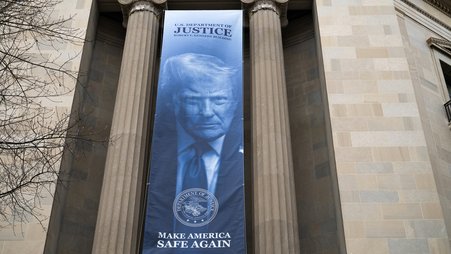Freedom of the Press Foundation (FPF) recently hosted a conversation with two journalists who unwittingly found themselves at the center of the story of press freedom in the U.S. in 2023: Marion County Record publisher Eric Meyer and Florida independent journalist Tim Burke. You can watch the conversation here or at the end of this article.
Newsroom raids have been rare in the United States since the passage of the Privacy Protection Act of 1980, but both Meyer and Burke had their newsrooms raided by law enforcement officers last year.
Meyer said that despite gaining subscribers, the Record is “struggling to get along” in the aftermath of the August 2023 raid, figuring out how to report the news while also being the news. “The truth of the matter is that it was pretty easy to put out the paper the first week [after the raid],” he said, because the staff were “running on adrenaline. But now the adrenaline is gone and we’re fighting tooth and toenail each week just to get the paper out.”
The raids of the Record and Meyer’s home drew significant media attention, especially after Meyer’s 98-year-old mother and the paper’s co-owner, Joan, died the next day (Meyer said authorities were considering criminally charging her before she died for allegedly shoving her walker into an officer).
The raid has faded from the national headlines, but journalists at the Record and elsewhere in Kansas continue to unravel the web of incompetence and malice that allowed it to happen.
Meyer intends to report the story and pursue his legal remedies, but he worries about causing reputational or financial harm to Marion. The whole reason he bought his hometown paper, he said, was to support the community. “This is not what we wanted to do,” he acknowledged.
Burke raid under the radar
The raid of Burke’s home newsroom, in contrast to the one in Marion, has received relatively little scrutiny.
FPF and other advocates are pushing for transparency from the Department of Justice on how it believes Burke broke the law when he used the internet to access outtakes of Tucker Carlson’s interview with Ye (formerly known as Kanye West). During the interview, Ye made antisemitic remarks that Fox News chose not to air.
The government’s position appears to be that Burke broke the law by accessing footage Fox didn’t want him to access — even though the footage was posted to a publicly available (albeit difficult to find) website. That’s quite concerning for journalists who see it as their job to find information the powerful prefer to keep hidden.
Equally concerning is the government’s seizure of confidential reporter’s notebooks whose contents Burke says have nothing to do with the story supposedly under investigation.
The government successfully opposed Burke’s request to unseal the warrant affidavit that would explain why he was targeted (Burke is appealing that ruling). And, according to Burke, there’s no footage of the raid because agents cut off his security cameras.
“I think that’s why my case has gotten so much less attention” compared to the Marion raid, he said. “There’s barely any record of it even happening. The government’s refusing to say anything about it.”
Burke expressed dismay both at the invasion of his space and at the potential criminalization of digital journalism — his life’s work. He wondered whether the agents conducting the raid thought to themselves, “Am I really trying to prosecute someone for exposing Kanye West as an antisemite? Is that why I got into the FBI? Because that’s what this is about.”
Both Burke, who said he’s open about his left-leaning views, and Meyer, who considers himself a conservative (though he takes care to distance himself from the current version of the Republican Party), noted the extensive support they’ve received from people of all political stripes.
They also expressed shared optimism that despite heated political rhetoric — including against the press — Americans across the board are disgusted by the notion of cops raiding newsrooms. As they should be.
Watch the full conversation below.





